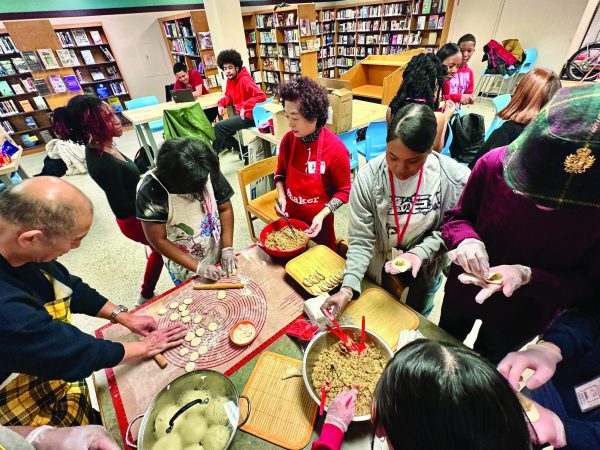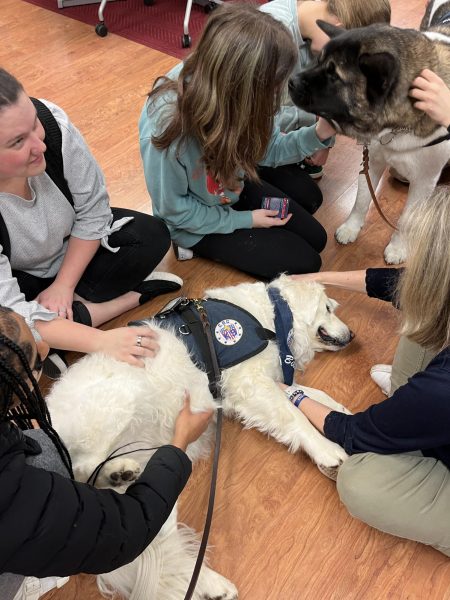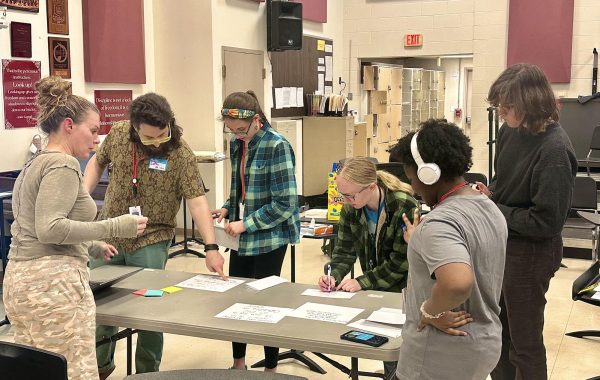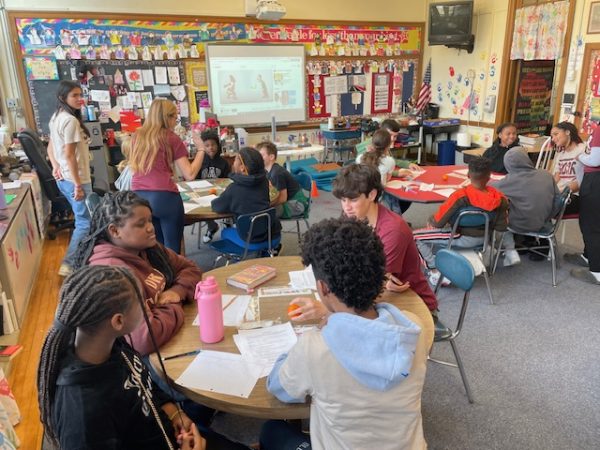Traversing the Soccer Landscape
Varsity women’s soccer coach Johnny Kimani has lived between two worlds, but soccer has remained a consistency.

Johnny Kimani is the varsity coach at Shaker Heights High School. Soccer has always been an important aspect of his life.
Johnny Kimani traveled from Kenya to the United States to play soccer. Growing up in a world that revolved around soccer, Kimani followed his passion to become the girls’ varsity coach at Shaker Heights High School.
“I’ve been moving back and forth for as long as I remember,” Kimani said.
Kimani traveled between Kenya to America for years. After attending Houghton College in western Houghton, New York on a soccer scholarship, he coached soccer at Hudson. He returned to Kenya and coached for three years at an international school, where he met his wife. They eventually returned to Ohio, and Kimani became the Shaker women’s varsity soccer coach.
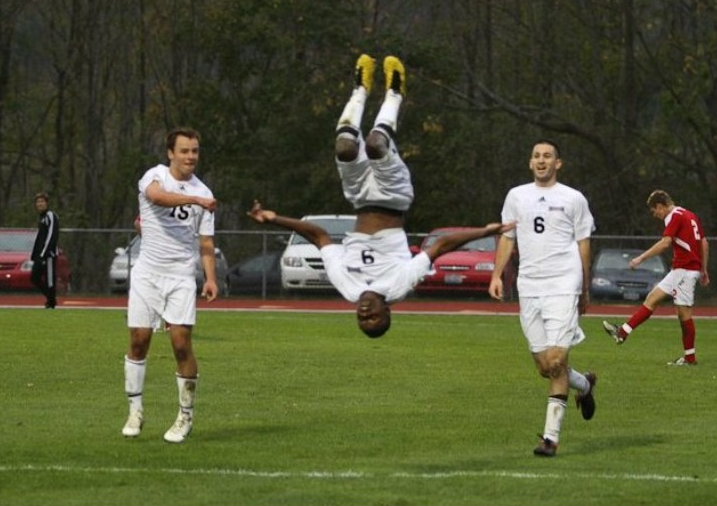
Kimani celebrating a good play.
This is Kimani’s first full season coaching for Shaker Heights, but he has also substituted in the schools. “I’m fascinated by every class,” he said. “I like math, but I also like science. I really enjoy those other classes because I learn a lot. History — right now, we’re living through history.” He substitutes in Orange and Crestwood schools as well.
As varsity coach, Kimani works with junior varsity coach Bradford Dorland, a first-year Spanish teacher and a first-year soccer coach.
“I pretty much mirrored everything that Coach Kimani was doing. So, if he had a certain strategy that he wanted to be put into place at the varsity level, then I would try and put that same strategy in the JV team,” Dorland said. The objective was to make the teams work like a program rather than two separate teams, he added.
Dorland describes Kimani as a passionate person, especially when concerning soccer. He said that Kimani’s unique personality gives him charisma, but most importantly, he is empathetic and understanding. Dorland said Kimani sees his team as people, not just soccer players.
Junior and soccer captain Rachel Weisman has been on varsity since her freshman year as a center back. She said that throughout the season, Kimani gave players surveys to determine their stress levels and amount of sleep. “He was really trying to make sure that we’re putting school first and that everything is OK. He’s very understanding if we need to cut practice short or not have practice one day,” she said.
Both Kimani and Dorland said they plan to stay at Shaker for a few years. “I plan on being here for a long time. I know Coach Johnny is really passionate about the program and he really cares about Shaker and how we do, and I think he’s going to be around,” said Dorland.
Weisman said that Kimani is more professional and insightful than her previous coaches because he takes soccer more seriously. “I think he’s just a step up,” she said. “I think it became more serious, like I was getting a lot more out of his coaching than I was in previous years.” Weisman said that Kimani is competitive and his spirit is infectious, but he sees the big picture and focuses on improvement rather than winning every game.
“There are only a few games where he says that this is one we need to win. This year especially, he was focusing on changing our style of play to meet his,” Weisman said.
Kimani has been playing soccer since he was 5 years old. “I grew up in a country where — kids on the weekend — that’s what we do,” Kimani said. Soccer is part of Kenyan culture, he said. “Everyone wants to make the national team, so it’s competitive. You want to be the kid selected to play. My high school was one of the best schools in Kenya,” he said.
Kimani wanted to play professionally. “But, I ruptured my kidney, and that’s why I stopped playing,” he said.
Despite his travel to and from Kenya, Kimani is trying become a U. S. citizen, but he won’t rush the process. “I’ve always had a green card, but I’ve not applied to be a citizen,” Kimani said.
As an immigrant, Kimani had to adapt to the social and political norms in America. As an immigrant from an African nation, however, in America’s current political climate, norms are changing.
On Jan. 11, several Congressional members present in a meeting with Donald Trump said that the president asked why the United States had to take migrants from “****hole countries,” such as Haiti and African nations.
“If you use common sense and values and logic, some of the things said out there make no sense. They don’t make sense to me,” Kimani said about Trump’s comments. “I’m not much into politics here in America,” Kimani said.
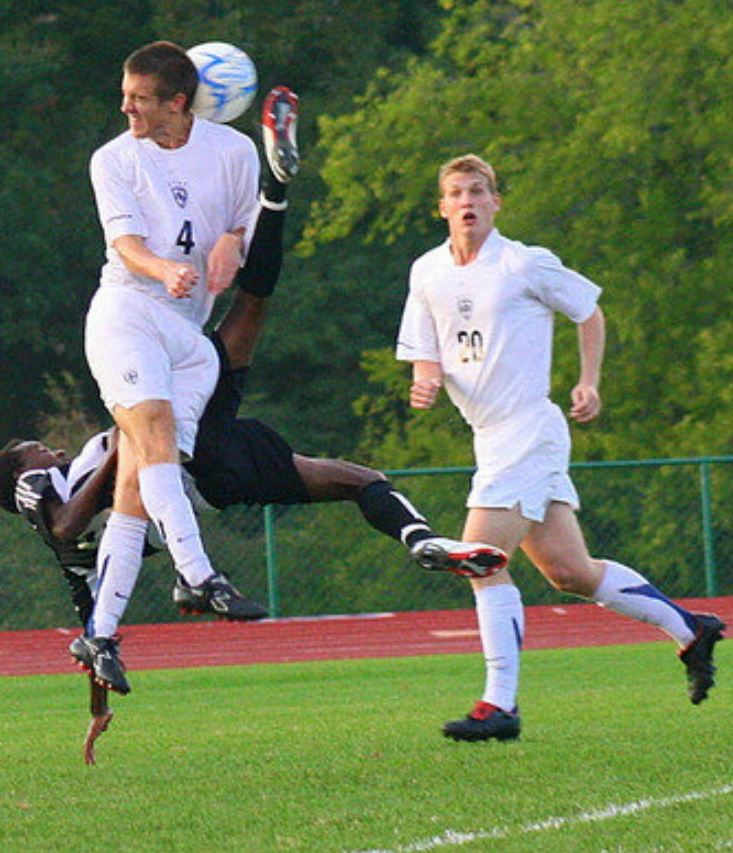
Kimani performing “the bicycle” in a soccer game.
“We’re going through tough politics in Kenya. We just voted for president in August. The guy who won, the courts said he wasn’t legitimate, so they had them redo it again,” he said. But corruption doesn’t stop at illegitimate candidates, according to Kimani. People die for politics in Kenya.
American politics are nowhere near as prejudicial as Kenyan politics, Kimani said. “You can wake up every day, smile, because there’s no violence, no people getting killed,” he said.
Kimani said that politics in Kenya often lead to the death of those who take a false step. The government runs on corruption, he said, and the worrisome government scare those who live there, like his brother and sister.
“Having lived in a third world country where politics are very dangerous, it’s taught me to let people who want to run the country run the country, because either way, they’ll do whatever it takes to be in charge of the country,” Kimani explained.
“I come from Kenya where, if you don’t get banished for talking about the government, you’re doing well. If you don’t go missing or you’re not found dead, you’re doing well in life,” Kimani said. Two people were killed before the Kenyan elections because of information on corrupt candidates, according to Kimani.
During the election period in Kenya, Kimani was scared for his family and friends living in Kenya. In 2007 and 2008, the elections brought Kenya into crisis. About 1,500 people were killed because of corruption among politicians. “My dad died in 1992 politics,” Kimani said.
Politics in Kenya have been corrupt for years. In 2009, the Triton Oil Scandal surfaced. The Kenyan Pipeline Company released oil without authorization. Triton Oil Company took $98.7 million from the Kenyan Pipeline Company. The owner of Triton Oil Company, Yagnesh Devani, is still in hiding because of an arrest warrant.
In October 2010, the Kenyan government bribed a South African company for armed personnel by giving them $15.8 billion in corrupt funds. High-ranking officers participated and the matter was investigated by Kenya’s Parliament. The same South African company was accused of international crime and drug smuggling by the United States of America and irregular tax and export controls by Mozambique.
Kimani never voted in Kenya, and doesn’t plan to vote in America once he gains citizenship. “Having come from Kenya, where a politician will say one thing and then do another thing and then get in power, so I don’t think voting for anyone who says what they want you to hear at the time makes sense, so that’s why I refrain from voting,” he said.
“For me, as long as everyone is happy with where they’re at, it’s good. But I’m not going to have someone force their values on me,” Kimani said.

This profile of women’s varsity soccer coach Johnny Kimani, written by freshman Journalism II reporter Olivia Warren, is part of the profile series we call Shaker Stories. In a novel activity, 42 Journalism II students — two juniors, one sophomore and 39 freshmen — devoted the third quarter to researching, reporting, drafting, editing and revising profiles of Shaker students, teachers, coaches, residents and alumni. Shakerite editors and Journalism II students suggested people they considered noteworthy. Journalism II students chose their subjects and invited them to participate.
Subjects who accepted agreed to at least three, 20-minute interviews, suggested other sources to be interviewed, submitted photos — and endured dozens of follow-up questions. Journalism II students completed research as necessary to portray their subjects’ subcultures, whether Irish dancing, competitive cube solving or editorial cartooning.
Over the next six weeks, The Shakerite will publish the products of this unprecedented effort. We invite you to read, enjoy and share these profiles widely. We thank everyone who cooperated with this enormous effort. We also encourage you to suggest more people whose Shaker stories we should know.
Comment using your Facebook, Yahoo, AOL or Hotmail account


